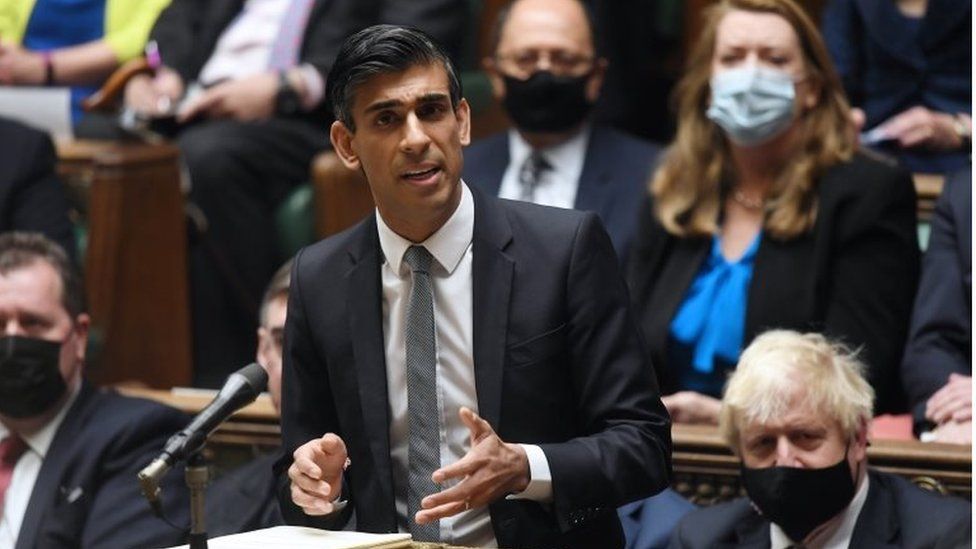Budget 2021: There has been a shift in Tory philosophy - minister
- Published
- comments

Wednesday's Budget - which saw tax and spending rise to record levels - represents a major shift in Tory philosophy, a minister has claimed.
The party has traditionally tried to cut taxes and keep spending down.
Treasury Secretary Simon Clarke said it was still committed to low taxes but made "no apologies" for increasing public spending.
Rishi Sunak told MPs the higher tax burden is down to the "unprecedented crisis" of the pandemic.
But the chancellor also turned on the spending taps in his Budget, after being widely expected to make cuts to in many government departments to help pay down the deficit.
He committed to spending increases of £150bn over three years, including nearly £2bn to help schools in England catch up following coronavirus, £6bn to tackle NHS backlogs and £7bn for transport projects.
The Institute for Fiscal Studies think tank said the spending plans were "more similar" to those of the Labour governments in the 2000s than those of George Osborne - a former Conservative chancellor.
Mr Clarke told BBC Newsnight: "The chancellor was very open about the fact that this is something of a philosophical shift.
"What we want to see is to get the economy turbocharged, unlock productivity, and to deliver growth more evenly across UK. That does require some upfront spending."
Mr Sunak has sought to calm the fears of some Conservative MPs that the party has abandoned its core economic principles.
"Taxes are rising to their highest level as a percentage of GDP since the 1950s - I don't like it, but I cannot apologise for it - it's the result of the unprecedented crisis," he said in his Budget speech.
"But now, we have a choice," he said, adding "do we want to live in a country where the response to every question is: "what is the government going to do about it?"
"Or do we choose to recognise that government has limits, that government should have limits."
He later insisted to ITV's Robert Peston that this was not "empty rhetoric", adding that both he and the prime minister wanted to deliver lower taxes by the end of the Parliament.
He also told a meeting of backbench Conservative MPs on Wednesday night that "in the future every marginal pound should be put into lowering taxes".
Labour's shadow chancellor Rachel Reeves told ITV News that it was important to raise money "but not in the way the government is doing it".
She said the government was introducing big taxes but said "those taxes are not falling on the banks - bankers got a tax cut" in reference to a 5% cut in the surcharge levied on banks' profits.
She added that Labour would raise taxes on "online giants who aren't paying their fair share".
Just before the chancellor got to his feet, one former minister on the right of the party said he hoped this would be a pivot moment: back to the kind of government action, where Conservatives were seeking to shrink the state, seeking to reduce taxes, seeking to pull back from some of the very big government moves they made because of the pandemic.
Rishi Sunak had a little bit of extra cash to play with, but instead of using that wriggle room he had, to signal the government was going to become smaller, in fact he staked his post out in a landscape where big government is here to stay, and eye-watering levels of tax are here to stay for the foreseeable future (although he seemed to dangle a promise of tax cuts before the next election).
That has created Conservative tensions but clearly it's the political calculation of him and Boris Johnson that it's the right thing to do.
Mr Sunak also used his Budget to repeat pre-announced measures, including an end to the public sector pay freeze and an increase to the National Living Wage from £8.91 per hour to £9.50.
According to Office for Budget Responsibility figures, household disposable income is set to rise by 0.8% per year.
Economic growth is forecast to rise to 6.3% next year - higher than previously predicted - but it will then slow to 1.3% by 2023.
New Budget measures included:
- A real-terms rise in spending for every government department
- A freeze on fuel duty
- Funding per pupil in England's schools is to be restored to 2010 levels over the next three years
- A 5% cut to the extra corporation tax banks have to pay to "maintain competitiveness"
- An extra £2.2bn for courts, prisons and probation services, including £500m to reduce courts backlogs
- A cut in air passenger duty for internal UK flights - and a tax rise on "ultra long haul" flights
- More support for industrial research and development
And the chancellor scrapped next year's planned increase in business rates in England and promised more frequent revaluations, and tax breaks for firms that make improvements to their properties, from 2023.
The government has faced strong criticism over its decision to reduce the universal credit benefit by £20-a-week.
Mr Sunak did not offer to maintain the £20 uplift - introduced during the pandemic - but instead announced that the "taper" would be cut so that instead of losing 63p of benefit for every £1 earned above the work allowance, the amount will be reduced to 55p.
Ms Reeves said that would not make up for the wider cuts to universal credit which affected five million families.
- YOU CAN HOP, BUT YOU CAN'T HIDE!: Join us for a classic Halloween film
- THE OUTLAWS: Stephen Merchant's brand new comedy-drama
- Published27 October 2021
- Published27 October 2021
- Published23 September 2022
- Published27 October 2021
- Published27 October 2021
- Published27 October 2021